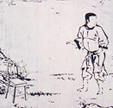At Canaan's Edge
A friend of mine recently gave me a book to read — At Canaan’s Edge: America in the King Years 1965-68, by Taylor Branch (2006). It’s a big book, the third volume of a trilogy described in the jacket notes as a “masterpiece of storytelling on American race, violence, and democracy.” That may be true.
Branch won a Pulitzer Prize for his second work in the series, Parting the Waters. The New York Times Book Review noted that At Canaan’s Edge contained “[c]ompelling portraits placed in the excitement of a period when oppressed and powerless people moving together changed themselves and their country profoundly and permanently.”* The Washington Post Book World called it “remarkable, meticulous…with the most complex and unsentimental version of King and his times yet produced.”
King’s strengths made him a towering figure in our history, the more so because his weaknesses remind us that he was a human being. A hagiography of the man would merely distort his achievements. But a hagiography of his killers is worse.
I skipped to the Epilogue to see how the story ended. And there I found the official myth, beautifully encapsulated, just as if it was true. More than a decade after Loyd Jowers’s confession, seven years after his trial, after Coretta King asked President Clinton for a Truth Commission and was rebuffed (See "Coretta," The Chair-Herding Pictures, 2/5/2006), Taylor Branch has learned nothing. The King family declared the lone assassin innocent. Branch dismissed that conclusion as the product of “fantastic theories grounded in dogma…” Who needs facts when the “fantastic theories” smear will do?
Realizing that most people are unfamiliar with the many questions surrounding King’s murder, I will not attempt to detail them here. I assume that Branch operated in good faith and that his errors concerning the killing of Dr. King arose from ignorance rather than deceit. However inadvertently, Taylor Branch wrote an elegant summary — indeed, a defense — of a lie. I hope the rest of the book is better.
* The scope of that change is somewhat in doubt following black disenfranchisement in Florida and Ohio in 2000 and 2004, not to mention the Katrina swindle. When Iraq held elections, poling facilities were set up in the United States to help Iraqis here vote. But the government will not establish poling arrangments for displaced New Orleanians to vote in the coming primary and general elections.
____________________
Branch won a Pulitzer Prize for his second work in the series, Parting the Waters. The New York Times Book Review noted that At Canaan’s Edge contained “[c]ompelling portraits placed in the excitement of a period when oppressed and powerless people moving together changed themselves and their country profoundly and permanently.”* The Washington Post Book World called it “remarkable, meticulous…with the most complex and unsentimental version of King and his times yet produced.”
King’s strengths made him a towering figure in our history, the more so because his weaknesses remind us that he was a human being. A hagiography of the man would merely distort his achievements. But a hagiography of his killers is worse.
I skipped to the Epilogue to see how the story ended. And there I found the official myth, beautifully encapsulated, just as if it was true. More than a decade after Loyd Jowers’s confession, seven years after his trial, after Coretta King asked President Clinton for a Truth Commission and was rebuffed (See "Coretta," The Chair-Herding Pictures, 2/5/2006), Taylor Branch has learned nothing. The King family declared the lone assassin innocent. Branch dismissed that conclusion as the product of “fantastic theories grounded in dogma…” Who needs facts when the “fantastic theories” smear will do?
Realizing that most people are unfamiliar with the many questions surrounding King’s murder, I will not attempt to detail them here. I assume that Branch operated in good faith and that his errors concerning the killing of Dr. King arose from ignorance rather than deceit. However inadvertently, Taylor Branch wrote an elegant summary — indeed, a defense — of a lie. I hope the rest of the book is better.
* The scope of that change is somewhat in doubt following black disenfranchisement in Florida and Ohio in 2000 and 2004, not to mention the Katrina swindle. When Iraq held elections, poling facilities were set up in the United States to help Iraqis here vote. But the government will not establish poling arrangments for displaced New Orleanians to vote in the coming primary and general elections.
____________________
Labels: Bill Clinton, Coretta King, Loyd Jowers, Martin Luther King, Taylor Branch


0 Comments:
Post a Comment
<< Home